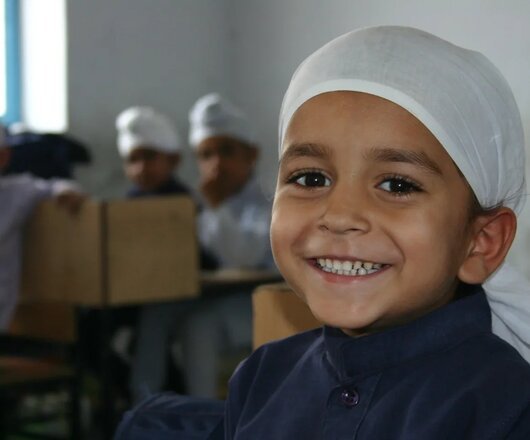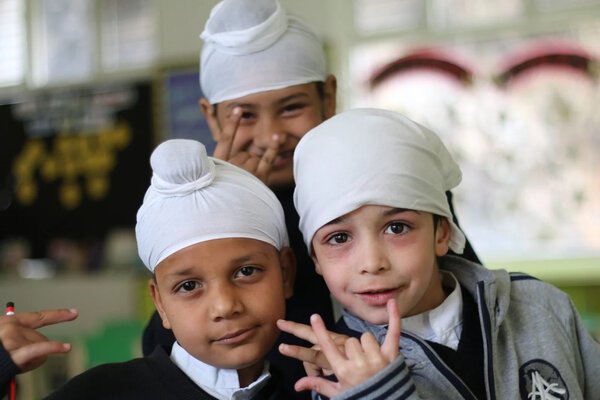Reach Us at info@csrforchange.com
- Address
The Kalgidhar Society,
F-3, Rajouri Garden, New Delhi -110027
F-3, Rajouri Garden, New Delhi -110027
- Phone
Mission Statement
AKAL VIDYA VICHARI
The mission of the flagship 'AKAL VIDYA VICHARI ' initiative at The Kalgidhar Society is to transform rural communities through high-quality education, focusing on empowering girls. With 130 Rural Academies and 2 Universities , we aim to unlock potential, promote equality, and build brighter futures.
Impact
Academies
Rural Schools
Geo Location
Northern States
FREE/AIDED
Underprivileged Students
Beneficiaries
Rural Students
Highlights
The Society operates 130 Rural Academies across five states, providing quality education to underserved rural communities. These academies focus on holistic development, offering a well-rounded curriculum and modern facilities to empower students and bridge educational gaps in remote areas.
Pathway to Higher Education
The Program includes a seamless integration into the higher education journey, paving the way for students to pursue advanced learning at ETERNAL UNIVERSITY and AKAL UNIVERSITY. These institutes are run by the organization with focus on holistic development to empower rural students and open their doors to a brighter future.
Holistic and Innovative Approach
The Program employs a holistic approach to education, combining academic excellence with moral teachings, extracurricular activities, and life skills. Using modern methods and technology, we create an engaging environment that fosters critical thinking, creativity, and leadership, preparing students to excel in all aspects of life.
The Educate to Save initiative is a global awareness and charity program where small businesses, communities, and individuals help provide scholarships and sponsor child education. It also supports the Rural Rise, Live and Learn, and Empowered Girls Programs.
Challenges and CSR Opportunities
Challenges
Combating Poverty Through Scholarships and Economic Support
Challenges: Economic instability in rural areas, primarily due to the unpredictability of agriculture, forces many students to drop out of school to support their families.
Opportunity: Corporations can mitigate this impact by supporting the Educate to Save initiative, which provides scholarships and sponsorships for child education. By offering financial aid and creating internships and job opportunities for graduates, businesses can help break the cycle of poverty. These contributions ensure that students remain in school, complete their education, and achieve better long-term economic outcomes for their communities.
Opportunity: Corporations can mitigate this impact by supporting the Educate to Save initiative, which provides scholarships and sponsorships for child education. By offering financial aid and creating internships and job opportunities for graduates, businesses can help break the cycle of poverty. These contributions ensure that students remain in school, complete their education, and achieve better long-term economic outcomes for their communities.
Infrastructure Development
Challenges: Rural areas often suffer from inadequate infrastructure, improper transport facilities, with lack of well constructed classrooms and a lack of basic amenities like clean water and washrooms, leading to irregular attendance and poor academic performance.
Opportunity: Corporations have a significant opportunity to address these challenges by funding the construction of well-equipped classrooms, installing RO water filters, sanitation facilities, and upgrading technology with smart classrooms and language labs.
Recently, the installation of 1,500 computers in 95 Akal Academies demonstrated the transformative impact of such contributions, greatly enhancing the learning environment for rural students.
Opportunity: Corporations have a significant opportunity to address these challenges by funding the construction of well-equipped classrooms, installing RO water filters, sanitation facilities, and upgrading technology with smart classrooms and language labs.
Recently, the installation of 1,500 computers in 95 Akal Academies demonstrated the transformative impact of such contributions, greatly enhancing the learning environment for rural students.
Supporting Teacher Training and Incentives
Challenges: A critical challenge in rural education is the shortage of qualified teachers, as socio-economic conditions often deter educators from urban areas from relocating to remote regions.
The Akal Institute of Rural Women Empowerment (AIRWE) and the EmpowerEd Girls upskilling initatives addresses this issue by offering a free residential program that trains underprivileged young women from remote areas to become educators.
Opportunity: Corporations can support this initiative by funding training programs, providing scholarships, and creating attractive incentives for teachers willing to work in rural areas. This not only improves educational quality but also empowers women and creates local employment opportunities and progress.
The Akal Institute of Rural Women Empowerment (AIRWE) and the EmpowerEd Girls upskilling initatives addresses this issue by offering a free residential program that trains underprivileged young women from remote areas to become educators.
Opportunity: Corporations can support this initiative by funding training programs, providing scholarships, and creating attractive incentives for teachers willing to work in rural areas. This not only improves educational quality but also empowers women and creates local employment opportunities and progress.
Bridging Policy Implementation Gaps
Challenges: The disparity between well-intentioned education policies and their implementation in rural areas results in educational inequalities. Villages lacking basic infrastructure struggle to meet policy standards, leaving rural students disadvantaged.
Opportunity: Corporates can bridge this gap by providing resources and expertise to support Kalgidhar Society’s initiatives. By funding the development of educational facilities, improving transportation and connectivity, and supporting policy advocacy efforts, businesses can ensure that rural students receive the full benefits of educational policies.
Opportunity: Corporates can bridge this gap by providing resources and expertise to support Kalgidhar Society’s initiatives. By funding the development of educational facilities, improving transportation and connectivity, and supporting policy advocacy efforts, businesses can ensure that rural students receive the full benefits of educational policies.

Benefits of Partnership
Make your CSR count
With vast areas in critical need of development in education, healthcare, and economic opportunities, infrastructure, CSR initiatives play an important transformative role in rural areas
01 Make Your CSR Count
Partner with us to transform education, healthcare, and infrastructure in rural areas.
02 Show Your Leadership
Demonstrate industry leadership by bridging the gap for rural communities.
03 Take Your Action
Contact us to learn how you can make an immediate impact.
04 Enhance Brand Reputation
Align with a cause that boosts customer loyalty and public perception.
05 Foster Community Development
Help improve lives by supporting education, healthcare, and infrastructure.
06 Empower Future Generations
Invest in education to equip the next generation with essential skills.
FAQ's : Education Initiatives
How does The Kagidhar Society measure the impact of its educational projects?
The Society utilizes various metrics such as student retention rates, academic performance, community feedback, and post-education outcomes to measure the effectiveness of its educational initiatives.
Can corporations contribute non-monetary resources or volunteer hours to support The Kagidhar Society's initiatives?
Yes, corporations can contribute non-monetary resources such as educational materials, infrastructure support, or offer employee volunteer programs to engage with the Society's projects.
What geographical areas does The Kagidhar Society operate in?
The Society primarily operates in rural areas across [specific regions], focusing on communities with limited access to quality education and resources.

